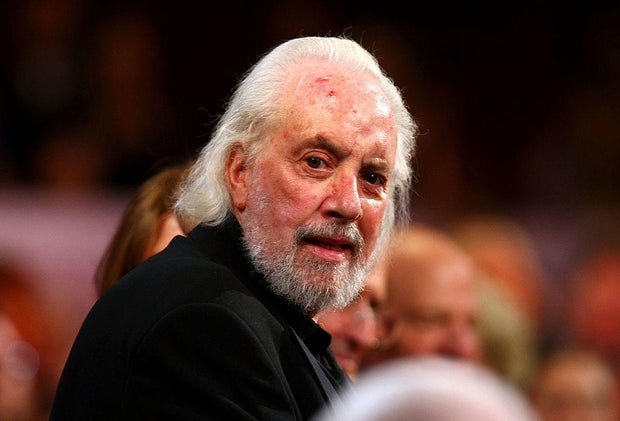CBS News
Could the 2024 presidential election affect baby name trends? Here’s what to know.

Pop culture and society often determine what baby names rise in popularity – but do politics affect name trends? History shows that some presidential first names peak in popularity when the man attached to the name enters the Oval Office. Their family members’ names might also spike in popularity on baby name lists. And this year with a female candidate in the mix, a woman’s name has the possibility to rise.
Will the popularity of baby names like Joe, Nikki or Donald be affected in 2024 – a presidential election year? Here’s what history has shown.
Popular presidential baby names
For many years, presidents’ first names often reached their peak in popularity in the year the president assumed office. On the Social Security Administration’s list of most popular baby names, the name Woodrow reached its peak popularity in 1913 – the same year former President Woodrow Wilson assumed office.
This name trend holds strong through several presidencies: Warren peaked in 1921 when Warren G. Harding assumed office; Herbert reached its peak in 1928 and 1929, the years former President Herbert Hoover won the election and assumed the presidency; Franklin peaked in 1933 when former President Franklin D. Roosevelt took office.
Dwight – as in former President Dwight D. Eisenhower – peaked in 1953, the year he assumed office.
Calvin Coolidge became president in August 1923 – when more than half the year was over. So, his name – Calvin – peaked in 1924, when the babies conceived after he became president were born.
Baby names tend to follow a 100-year rule, meaning some names cycle back to popularity after about a century. “Once it becomes their great-grandparents’ generation and they probably didn’t know the people of that generation themselves, then it can start to seem cool and retro [to parents] because they don’t associate it with gray hair and wrinkles,” Dr. Cleveland Evans, a psychology professor and author of books on baby names, told CBS News in 2021.
The name Theodore was at spot 43 out of 1,000 in 1901 when former President Theodore Roosevelt assumed office. But the name came back around and reached its peak more than 100 years later – in 2021 when it reached the number 10 spot.
Classic baby names
Many presidents have classic names – John, George, William, Donald – that have been on the top 1,000 list for decades and peaked before these men were born.
John was already ultra popular in the 1940s and 1950s, hovering around the third and fourth spots. But the name’s popularity started waning in the late 50s when it dropped to the number five spot.
When John F. Kennedy Jr. was elected president in 1960, the name John moved into the fourth spot again. When the president was assassinated in 1963, the name moved into the number two spot and stayed there until 1965. The name saw its highest number of births in 1965, with 71,519 babies named John born in the U.S.
Kennedy’s vice president, Lyndon B. Johnson, became president immediately after his assassination on November 22, 1963. Continuing the trend, the name Lyndon peaked in 1964, reaching the 347th spot on the top 1,000 list.
Names associated with presidents
The name Hillary was most popular in 1992 – the year Hillary Clinton’s husband, former President Bill Clinton was elected president – peaking at 132 on SSA’s top 1,000 list.
She went on to serve as first lady for two terms then became a senator and secretary of state and the name’s popularity slowly fell down the ranks. But in 2008, when she ran for president, it briefly spiked again rising from the 961st spot to 722 before falling off the list of top 1,000 names.
Former President George W. Bush’s daughter, Jenna, was born in 1981. But her name peaked at the 45th spot in 2001 – the year her dad assumed office. It has steadily declined in popularity since then but is still in the top 1,000 as of 2022, in spot 635.
Similarly, the name Malia – the name of former President Barack Obama’s eldest daughter – saw its peak in 2009, the year he took office. Her younger sister’s name, Sasha, saw a similar spike that year, rising from the 361st spot in 2008 to 262 in 2009. But Sasha’s peak was in 1988 at 147.
2024 Presidential Candidate names
Donald – like former President Donald Trump, who is the Republican front-runner – peaked in 1934, according to SSA. In 2022 his name was in the 676th spot.
The name sits at 601 on BabyCenter, which uses data from parents on the popularity of baby names. Donald means “world ruler” according to its Gaelic origins, a primitive Irish language still spoken in parts of Scotland, from the name Domhnall.
Similarly, Joseph – like President Joe Biden who is running for his second term – peaked in 1917, according to SSA. The name has been in the top 20 names for the majority of years since then but dropped to number 30 in 2022.
According to BabyCenter the name, rooted in the Hebrew name Yosef, meaning “God shall add,” according to several baby name websites, ranks at number 56 on its list.
Nikki – the nickname of Republican candidate Nikki Haley – peaked in 1972 on the SSA list. That happens to be the year Haley, whose real name is Nimarata Nikki Haley – was born. The name Nikki ranks at 2,405 in popularity with parents on BabyCenter. It fell off the SSA’s top 1,000 list in 2005.
CBS News
7/2: CBS Evening News – CBS News

Watch CBS News
Be the first to know
Get browser notifications for breaking news, live events, and exclusive reporting.
CBS News
Robert Towne, legendary Hollywood screenwriter of “Chinatown,” dies at 89

Robert Towne, the Oscar-winning screenplay writer of “Shampoo,” “The Last Detail” and other acclaimed films whose work on “Chinatown” became a model of the art form and helped define the jaded allure of his native Los Angeles, has died. He was 89.
Towne “passed away peacefully surrounded by his loving family” Monday at his home in Los Angeles, his publicist Carri McClure, told CBS News in a statement. She did not provide a cause of death.
In an industry which gave birth to rueful jokes about the writer’s status, Towne for a time held prestige comparable to the actors and directors he worked with. Through his friendships with two of the biggest stars of the 1960s and ’70s, Warren Beatty and Jack Nicholson, he wrote or co-wrote some of the signature films of an era when artists held an unusual level of creative control. The rare “auteur” among screen writers, Towne managed to bring a highly personal and influential vision of Los Angeles onto the screen.
Alberto E. Rodriguez/Getty Images for AFI
“It’s a city that’s so illusory,” Towne told The Associated Press in a 2006 interview. “It’s the westernmost west of America. It’s a sort of place of last resort. It’s a place where, in a word, people go to make their dreams come true. And they’re forever disappointed.”
Recognizable around Hollywood for his high forehead and full beard, Towne won an Academy Award for “Chinatown” and was nominated three other times, for “The Last Detail,” “Shampoo” and “Greystoke.” In 1997, he received a lifetime achievement award from the Writers Guild of America.
“His life, like the characters he created, was incisive, iconoclastic and entirely (original),” said “Shampoo” actor Lee Grant on X.
Towne was born Robert Bertram Schwartz in Los Angeles and moved to San Pedro after his father’s business, a dress shop, closed down because of the Great Depression. His father changed the family name to Towne.
Towne’s success came after a long stretch of working in television, including “The Man from U.N.C.L.E” and “The Lloyd Bridges Show,” and on low-budget movies for “B” producer Roger Corman. In a classic show business story, he owed his breakthrough in part to his psychiatrist, through whom he met Beatty, a fellow patient. As Beatty worked on “Bonnie and Clyde,” he brought in Towne for revisions of the Robert Benton-David Newman script and had him on the set while the movie was filmed in Texas.
Towne’s contributions were uncredited for “Bonnie and Clyde,” the landmark crime film released in 1967, and for years he was a favorite ghost writer. He helped out on “The Godfather,” “The Parallax View” and “Heaven Can Wait” among others and referred to himself as a “relief pitcher who could come in for an inning, not pitch the whole game.” But Towne was credited by name for Nicholson’s macho “The Last Detail” and Beatty’s sex comedy “Shampoo” and was immortalized by “Chinatown,” the 1974 thriller set during the Great Depression.
“Chinatown” was directed by Roman Polanski and starred Nicholson as J.J. “Jake” Gittes, a private detective asked to follow the husband of Evelyn Mulwray (played by Faye Dunaway). The husband is chief engineer of the Los Angeles Department of Water and Power and Gittes finds himself caught in a chaotic spiral of corruption and violence, embodied by Evelyn’s ruthless father, Noah Cross (John Huston).
Influenced by the fiction of Raymond Chandler, Towne resurrected the menace and mood of a classic Los Angeles film noir, but cast Gittes’ labyrinthine odyssey across a grander and more insidious portrait of Southern California. Clues accumulate into a timeless detective tale, and lead helplessly to tragedy, summed up by one of the most repeated lines in movie history, words of grim fatalism a devastated Gittes receives from his partner Lawrence Walsh (Joe Mantell): “Forget it, Jake, it’s Chinatown.”
The back story of “Chinatown” has itself become a kind of detective story, explored in producer Robert Evans’ memoir, “The Kid Stays in the Picture”; in Peter Biskind’s “East Riders, Raging Bulls,” a history of 1960s-1970s Hollywood, and in Sam Wasson’s “The Big Goodbye,” dedicated entirely to “Chinatown.” In “The Big Goodbye,” published in 2020, Wasson alleged that Towne was helped extensively by a ghost writer — former college roommate Edward Taylor. According to “The Big Goodbye,” for which Towne declined to be interviewed, Taylor did not ask for credit on the film because his “friendship with Robert” mattered more.
The studios assumed more power after the mid-1970s and Towne’s standing declined. His own efforts at directing, including “Personal Best” and “Tequila Sunrise,” had mixed results. “The Two Jakes,” the long-awaited sequel to “Chinatown,” was a commercial and critical disappointment when released in 1990 and led to a temporary estrangement between Towne and Nicholson.
Around the same time, he agreed to work on a movie far removed from the art-house aspirations of the ’70s, the Don Simpson-Jerry Bruckheimer production “Days of Thunder,” starring Tom Cruise as a race car driver and Robert Duvall as his crew chief. The 1990 movie was famously over budget and mostly panned, although its admirers include Quentin Tarantino and countless racing fans. And Towne’s script popularized an expression used by Duvall after Cruise complains another car slammed him: “He didn’t slam into you, he didn’t bump you, he didn’t nudge you. He rubbed you.
“And rubbin,′ son, is racin.'”
Towne later worked with Cruise on “The Firm” and the first two “Mission: Impossible” movies. His most recent film was “Ask the Dust,” a Los Angeles story he wrote and directed that came out in 2006. Towne was married twice, the second time to Luisa Gaule, and had two children. His brother, Roger Towne, also wrote screenplays, his credits include “The Natural.”
CBS News
Analyzing impact of Supreme Court’s Trump immunity decision

Watch CBS News
Be the first to know
Get browser notifications for breaking news, live events, and exclusive reporting.








